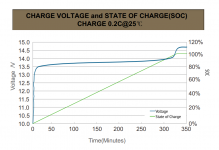Steveandjulie
Full Member
- Messages
- 1,749
I bought a 200ah lithium battery off a lovely chap called Mark cheesman of life power batteries over a year ago it was very reasonable price and his help and support has been amazing recently the battery has been misbehaving shutting down sent screenshots of app for the battery he told me I was using old version so he sent me a link to New version and told me to fully charge battery and see what happens we went on holiday to Devon when after a day the battery shut down the new version of the app showing cell 3 was low luckily we were on ehu so could charge the battery. So emailed Mark to explain the problem he phoned me straight away and said would send a replacement battery to the holiday park we were staying at and should arrive next day and he will include a return label so I can send the old battery back when I get home the replacement battery arrived and is now in the van I just can't get over what a brilliant service mark provides and would definitely recommend his company to anyone looking for a lithium battery he has a website but I don't know how to attach link's so maybe someone can attach a link that knows how to

